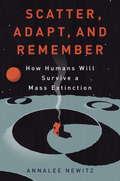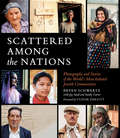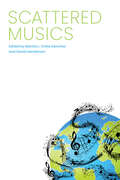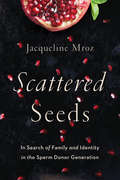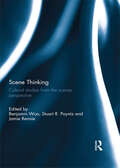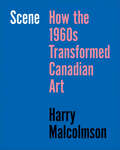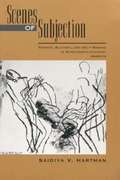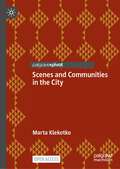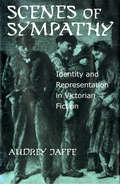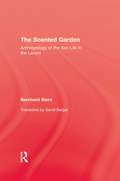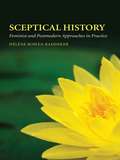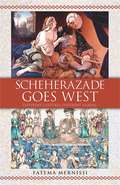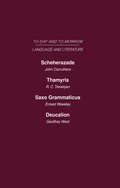- Table View
- List View
Scatter, Adapt, and Remember
by Annalee NewitzIn its 4.5 billion-year history, life on Earth has been almost erased at least half a dozen times: shattered by asteroid impacts, entombed in ice, smothered by methane, and torn apart by unfathomably powerful megavolcanoes. And we know that another global disaster is eventually headed our way. Can we survive it? How?As a species, Homo sapiens is at a crossroads. Study of our planet's turbulent past suggests that we are overdue for a catastrophic disaster, whether caused by nature or by human interference.It's a frightening prospect, as each of the Earth's past major disasters--from meteor strikes to bombardment by cosmic radiation--resulted in a mass extinction, where more than 75 percent of the planet's species died out. But in Scatter, Adapt, and Remember, Annalee Newitz, science journalist and editor of the science Web site io9.com explains that although global disaster is all but inevitable, our chances of long-term species survival are better than ever. Life on Earth has come close to annihilation--humans have, more than once, narrowly avoided extinction just during the last million years--but every single time a few creatures survived, evolving to adapt to the harshest of conditions. This brilliantly speculative work of popular science focuses on humanity's long history of dodging the bullet, as well as on new threats that we may face in years to come. Most important, it explores how scientific breakthroughs today will help us avoid disasters tomorrow. From simulating tsunamis to studying central Turkey's ancient underground cities; from cultivating cyanobacteria for "living cities" to designing space elevators to make space colonies cost-effective; from using math to stop pandemics to studying the remarkable survival strategies of gray whales, scientists and researchers the world over are discovering the keys to long-term resilience and learning how humans can choose life over death. Newitz's remarkable and fascinating journey through the science of mass extinctions is a powerful argument about human ingenuity and our ability to change. In a world populated by doomsday preppers and media commentators obsessively forecasting our demise, Scatter, Adapt, and Remember is a compelling voice of hope. It leads us away from apocalyptic thinking into a future where we live to build a better world--on this planet and perhaps on others. Readers of this book will be equipped scientifically, intellectually, and emotionally to face whatever the future holds.
Scattered
by Diana Howansky ReillyFollowing World War II, the communist government of Poland forcibly relocated the country's Ukrainian minority by means of a Soviet-Polish population exchange and then a secretly planned action code-named Operation Vistula. InScattered, Diana Howansky Reilly recounts these events through the experiences of three siblings caught up in the conflict, during a turbulent period when compulsory resettlement was a common political tactic used against national minorities to create homogenous states. Born in the Lemko region of southeastern Poland, Petro, Melania, and Hania Pyrtej survived World War II only to be separated by political decisions over which they had no control. Petro relocated with his wife to Soviet Ukraine during the population exchange of 1944–46, while his sisters Melania and Hania were resettled to western Poland through Operation Vistula in 1947. As the Ukrainian Insurgent Army fought resettlement, the Polish government meanwhile imprisoned suspected sympathizers within the Jaworzno concentration camp. Melania, Reilly's maternal grandmother, eventually found her way to the United States during Poland's period of liberalization in the 1960s. Drawing on oral interviews and archival research, Reilly tells a fascinating, true story that provides a bottom-up perspective and illustrates the impact of extraordinary historical events on the lives of ordinary people. Tracing the story to the present, she describes survivors' efforts to receive compensation for the destruction of their homes and communities.
Scattered Among the Nations: Photographs and Stories of the World's Most Isolated Jewish Communities
by Bryan Schwartz Jay Sand Sandy Carter“A beautifully presented book on Jewish diversity around the world . . . opens windows into lives from the hills of Portugal to the plains of Africa.” —The Jerusalem PostWith vibrant photographs and intricate accounts Scattered Among the Nations tells the story of the world’s most isolated Jewish communities in Africa, Asia, Latin America, the Former Soviet Union and the margins of Europe. Over two thousand years ago, a shipwreck left seven Jewish couples stranded off India’s Konkan Coast, south of Bombay. Those hardy survivors stayed, built a community, and founded one of the fascinating groups described in this book—the Bene Israel of India’s Maharasthra Province. This story is unique, but it is not unusual. We have all heard the phrase “the lost tribes of Israel,” but never has the truth and wonder of the Diaspora been so lovingly and richly illustrated. To create this amazing chronicle of faith and resilience, the authors visited Jews in thirty countries across five continents, hearing origin stories and family histories that stretch back for millennia.“Beautiful, even breathtaking . . . a Jewish (Inter) National Geographic, wisely reminding us that the strategies for survival of Jews in distant lands may be relevant to our own.” —Rabbi Lawrence Kushner, Emanu-El Scholar at Congregation Emanu-El of San Francisco and author of I’m God; You’re Not“This exquisite book is a gift to the Jewish people, dramatically stretching our understanding of ‘Jewish’ . . . A book to be savored, read and re-read, and transmitted from one generation to the next.” —Yossi Klein Halevi, Senior Fellow, Shalom Hartman Institute, Jerusalem
Scattered Musics
by Martha I. Chew Sánchez and David HendersonContributions by Nilanjana Bhattacharjya, Benjamin Burkhart, Ivy Chevers, Martha I. Chew Sánchez, Athena Elafros, William García-Medina, Sara Goek, David Henderson, Eyvind Kang, Junko Oba, Juan David Rubio Restrepo, and Gareth Dylan SmithIn Scattered Musics, editors Martha I. Chew Sánchez and David Henderson, along with a range of authors from a variety of scholarly backgrounds, consider the musics that diaspora and migrant populations are inspired to create, how musics and musicians travel, and how they change in transit. The authors cover a lot of ground: cumbia in Mexico, música sertaneja in Japan, hip-hop in Canada, Irish music in the US and the UK, reggae and dancehall in Germany, and more. Diasporic groups transform the musical expressions of their home countries as well as those in their host communities. The studies collected here show how these transformations are ways of grappling with ever-changing patterns of movement. Different diasporas hold their homelands in different regards. Some communities try to re-create home away from home in musical performances, while others use music to critique and redefine their senses of home. Through music, people seek to reconstruct and refine collective memory and a collective sense of place.The essays in this volume—by sociologists, historians, ethnomusicologists, and others—explore these questions in ways that are theoretically sophisticated yet readable, making evident the complexities of musical and social phenomena in diaspora and migrant populations. As the opening paragraph of the introduction to the volume observes, “What remains when people have been scattered apart is a strong urge to gather together, to collect.” At few times in our lives has that ever been more apparent than right now.
Scattered Seeds: In Search of Family and Identity in the Sperm Donor Generation
by Jacqueline MrozAs typical as donor-conceived children have become, with at least a million such children in the US alone, their experiences are still unusual in many ways. In Scattered Seeds, journalist and writer Jacqueline Mroz looks at the growth of sperm donation and assisted reproduction and how it affects the children who are born, the women who buy and use the sperm to have kids, and the sperm donors who donate their genetic material to help others procreate. With empathy and in-depth analysis, Scattered Seeds explores the sociology, psychology, and anthropology surrounding those connected with fertility procedures today and looks back at the history that brought us to this point.The personal stories in this book will put a human face on the issues and help to illuminate this country's controversial and troubling unregulated fertility industry-an industry that has been compared to the Wild, Wild West, where anything goes. What is the human cost of our country's unregulated fertility industry? How are the lives of sperm-donor families changed? Scattered Seeds will answer those questions, considering carefully the social and psychological dynamics surrounding those connected with fertility procedures today.
Scattered and Fugitive Things: How Black Collectors Created Archives and Remade History (Black Lives in the Diaspora: Past / Present / Future)
by Laura HeltonDuring the first half of the twentieth century, a group of collectors and creators dedicated themselves to documenting the history of African American life. At a time when dominant institutions cast doubt on the value or even the idea of Black history, these bibliophiles, scrapbookers, and librarians created an enduring set of African diasporic archives. In building these institutions and amassing abundant archival material, they also reshaped Black public culture, animating inquiry into the nature and meaning of Black history.Scattered and Fugitive Things tells the stories of these Black collectors, traveling from the parlors of the urban north to HBCU reading rooms and branch libraries in the Jim Crow south. Laura E. Helton chronicles the work of six key figures: bibliophile Arturo Schomburg, scrapbook maker Alexander Gumby, librarians Virginia Lee and Vivian Harsh, curator Dorothy Porter, and historian L. D. Reddick. Drawing on overlooked sources such as book lists and card catalogs, she reveals the risks collectors took to create Black archives. This book also explores the social life of collecting, highlighting the communities that used these collections from the South Side of Chicago to Roanoke, Virginia. In each case, Helton argues, archiving was alive in the present, a site of intellectual experiment, creative abundance, and political possibility. Offering new ways to understand Black intellectual and literary history, Scattered and Fugitive Things reveals Black collecting as a radical critical tradition that reimagines past, present, and future.
Scene Thinking: Cultural Studies from the Scenes Perspective
by Benjamin Woo, Stuart R. Poyntz and Jamie RennieHow is cultural activity shaped by the places where it unfolds? One answer has been found in the ‘scenes perspective’, a development within popular music studies that explains change and transformation within musical practices in terms of the social and institutional histories of scenes. Scene Thinking: Cultural Studies from the Scenes Perspective takes up this framework – and the mode of analysis that goes with it – as an important contribution to cultural analysis and social research more generally. In a series of focused case studies – ranging across practices like drag kinging, Bangladeshi underground music, urban arts interventions and sites like single performance venues, urban neighbourhoods in various states of gentrification, and virtual networks of game consoles in countless living rooms – the authors demonstrate how ‘scene thinking’ can enrich cultural studies inquiry. As a humanistic, empirically oriented alternative to network-based social ontologies, thinking in terms of scenes sensitizes researchers to complex, fluid processes that are nonetheless anchored and made meaningful at the level of lived experience. This book was originally published as a special issue of Cultural Studies.
Scene: How the 1960s Transformed Canadian Art
by Harry MalcolmsonThe 1960s transformed art in Canada. The Scene traces the remarkable reshaping of the Canadian art landscape during that era. Written by renowned art critic Harry Malcolmson, the book offers a captivating insider’s perspective on how a surge of artists, galleries, collectors, and critics propelled Canadian art into the global spotlight. Malcolmson identifies the catalysts that ignited this artistic renaissance, including an outpouring of pride in the country linked to Canada's Centennial, Expos ’67, and the Toronto City Hall. With rich anecdotes and insights, the book paints a comprehensive portrait of the era, while showcasing over twenty portraits of influential Canadian artists. Richly illustrated, the book illuminates the totality of the Scene’s evolution, and delves into the impact of Canadian nationalism and economic prosperity on the Scene. It examines the rise of contemporary institutions, such as the Art Gallery of Ontario and the National Gallery of Canada, capturing the emergence of a modern Canadian identity. Ultimately, The Scene stands as a unique testament to a pivotal moment in cultural history, capturing the essence of the most impactful decade in the history of art in Canada.
Scenes Of Subjection: Terror, Slavery, And Self-making In Nineteenth-century America
by Saidiya HartmanIn this provocative and original exploration of racial subjugation during slavery and its aftermath, Saidiya Hartman illumines the forms of terror and resistance that shaped black identity. <P><P>Scenes of Subjection examines the forms of domination that usually go undetected; in particular, the encroachments of power that take place through notions of humanity, enjoyment, protection, rights, and consent. By looking at slave narratives, plantation diaries, popular theater, slave performance, freedmen's primers, and legal cases, Hartman investigates a wide variety of "scenes" ranging from the auction block and minstrel show to the staging of the self-possessed and rights-bearing individual of freedom. <P><P>While attentive to the performance of power—the terrible spectacles of slaveholders' dominion and the innocent amusements designed to abase and pacify the enslaved—and the entanglements of pleasure and terror in these displays of mastery, Hartman also examines the possibilities for resistance, redress and transformation embodied in black performance and everyday practice. <P><P>This important study contends that despite the legal abolition of slavery, emergent notions of individual will and responsibility revealed the tragic continuities between slavery and freedom. Bold and persuasively argued, Scenes of Subjection will engage readers in a broad range of historical, literary, and cultural studies.
Scenes and Communities in the City
by Marta KlekotkoThis open access book addresses the problem of creation and reproduction processes of contemporary urban communities, as well as cultural mechanisms and factors of these processes. Rejecting both the environmental determinism, and cultural reductionism of community studies, the book assumes that the postmodern city is a space of diverse urban communities that go far beyond the traditional concept of neighbourhood as well as personal and imagined communities, and thus proposes to comprehend urban community as social practice embedded in urban space. The book applies the Theory of Social Practice and the Theory of Scenes and develops the concept of socio-cultural opportunity structures in order to explain how cultural practices of individuals and symbolic dimensions of territory interact, leading to (re)production of various forms of urban community. It is assumed that culture in general and symbolic meanings of territory in particular, play a crucial role in the process of (re)production of urban communities, that this process takes place in collective cultural consciousness and is mediated by territorially embedded cultural practices of individuals. The book overcomes theoretical gaps in classical community studies and develops a new perspective on urban communal processes based on the analysis of social practices in urban cultural scenes.
Scenes from the High Desert: Julian Steward's Life and Theory
by Virginia KernsJulian Steward (1902-72) is best remembered in American anthropology as the creator of cultural ecology, a theoretical approach that has influenced generations of archaeologists and cultural anthropologists. Virginia Kerns considers the intellectual and emotional influences of Steward's remarkable career, exploring his early life in the American West, his continued attachments to western landscapes and inhabitants, his research with Native Americans, and the writing of his classic work, Theory of Culture Change. With fluid prose and rich detail, the book captures the essence and breadth of Steward's career while carefully measuring the ways he reinforced the male-centered structure of mid-twentieth-century American anthropology.
Scenes of Attention: Essays on Mind, Time, and the Senses
by Burnett, D. Graham; Smith, Justin E. H.Are we paying enough attention? At least since the nineteenth century, critics have alleged a widespread and profound failure of attentiveness—to others, to ourselves, to the world around us, to what is truly worthy of focus. Why is there such great anxiety over attention? What is at stake in understanding attention and the challenges it faces?This book investigates attention from a range of disciplinary perspectives, including philosophy, history, anthropology, art history, and comparative literature. Each chapter begins with a concrete scene whose protagonists are trying—and often failing—to attend. Authors examine key moments in the history of the study of attention; pose attention as a philosophical problem; explore the links between attention, culture, and technology; and consider the significance of attention for conceptualizations of human subjectivity. Readers encounter nineteenth-century experiments in boredom, ornithologists conveying sound through field notations, wearable attention-enhancing prosthetics, students using online learning platforms, and inquiries into attention as a cognitive state and moral virtue.Amid mounting concern about digital mediation of experience, the rise of “surveillance capitalism,” and the commodification of attention, Scenes of Attention deepens the thinking that is needed to protect the freedom of attention and the forms of life that make it possible.
Scenes of Childhood
by Sylvia Townsend WarnerIn the course of her brilliant career Sylvia Townsend Warner wrote superbly in many and diverse forms but never penned a memoir, properly speaking. However, from the 1930s to the 1970s she did contribute a series of short reminiscences to the New Yorker. Scenes of Childhood collects and orders those reminiscences, thus forming a volume that reads as a joyous, wry and moving testament to the experience of being alive. The collection evokes a recognisably English world of nannies, butlers, pet podles, public schools, 'good works' and country churches, but the resonances of these stories are universal - funny and touching by turns.
Scenes of Subjection: Terror, Slavery, and Self-Making in Nineteenth-Century America
by Saidiya HartmanThe groundbreaking debut by the award-winning author of Wayward Lives, Beautiful Experiments, revised and updated. Saidiya Hartman has been praised as “one of our most brilliant contemporary thinkers” (Claudia Rankine, New York Times Book Review) and “a lodestar for a generation of students and, increasingly, for politically engaged people outside the academy” (Alexis Okeowo, The New Yorker). In Scenes of Subjection—Hartman’s first book, now revised and expanded—her singular talents and analytical framework turn away from the “terrible spectacle” and toward the forms of routine terror and quotidian violence characteristic of slavery, illuminating the intertwining of injury, subjugation, and selfhood even in abolitionist depictions of enslavement. By attending to the withheld and overlooked at the margins of the historical archive, Hartman radically reshapes our understanding of history, in a work as resonant today as it was on first publication, now for a new generation of readers. This 25th anniversary edition features a new preface by the author, a foreword by Keeanga-Yamahtta Taylor, an afterword by Marisa J. Fuentes and Sarah Haley, notations with Cameron Rowland, and compositions by Torkwase Dyson.
Scenes of Sympathy: Identity and Representation in Victorian Fiction
by Audrey JaffeIn Scenes of Sympathy, Audrey Jaffe argues that representations of sympathy in Victorian fiction both reveal and unsettle Victorian ideologies of identity. Situating these representations within the context of Victorian visual culture, and offering new readings of key works by Charles Dickens, Elizabeth Gaskell, Ellen Wood, George Eliot, Oscar Wilde, and Arthur Conan Doyle, Jaffe shows how mid-Victorian spectacles of social difference construct the middle-class self, and how late-Victorian narratives of feeling pave the way for the sympathetic affinities of contemporary identity politics. Perceptive and elegantly written, Scenes of Sympathy is the first detailed examination of the place of sympathy in Victorian fiction and ideology. It will redirect the current critical conversation about sympathy and refocus discussions of late-Victorian fictions of identity.
Scenes, Semiotics and The New Real: Exploring the Value of Originality and Difference
by Chris BrownThis book provides a semiotic analysis of 'scenes', powerful vehicles for introducing new ideas, perspectives and behaviours, as a concept. In particular, it examines the types of scene that exist; explores their effectiveness in spreading new ideas; and considers their vital role in introducing originality and difference in modern society.
Scenescapes: How Qualities of Place Shape Social Life
by Daniel Aaron Silver Terry Nichols ClarkLet's set the scene: there's a regular on his barstool, beer in hand. He's watching a young couple execute a complicated series of moves on the dance floor, while at the table in the corner the DJ adjusts his headphones and slips a new beat into the mix. These are all experiences created by a given scene--one where we feel connected to other people, in places like a bar or a community center, a neighborhood parish or even a train station. Scenes enable experiences, but they also cultivate skills, create ambiances, and nourish communities. In Scenescapes, Daniel Aaron Silver and Terry Nichols Clark examine the patterns and consequences of the amenities that define our streets and strips. They articulate the core dimensions of the theatricality, authenticity, and legitimacy of local scenes--cafes, churches, restaurants, parks, galleries, bowling alleys, and more. Scenescapes not only reimagines cities in cultural terms, it details how scenes shape economic development, residential patterns, and political attitudes and actions. In vivid detail and with wide-angle analyses--encompassing an analysis of 40,000 ZIP codes--Silver and Clark give readers tools for thinking about place; tools that can teach us where to live, work, or relax, and how to organize our communities.
Scented Garden: Anthropology Of The Sex Life In The Levant
by SternFirst published in 2008. Routledge is an imprint of Taylor & Francis, an informa company.
Scented Visions: Smell in Art, 1850-1914 (Perspectives on Sensory History)
by Christina BradstreetSmell loomed large in cultural discourse in the late nineteenth century, thanks to the midcentury fear of miasma, the drive for sanitation reform, and the rise in artificial perfumery. Meanwhile, the science of olfaction remained largely mysterious, prompting an impulse to “see smell” and inspiring some artists to picture scent in order to better know and control it. This book recovers the substantive role of the olfactory in Pre-Raphaelite art and Aestheticism.Christina Bradstreet examines the iconography and symbolism of scent in nineteenth-century art and visual culture. Fragrant imagery in the work of John Everett Millais, Dante Gabriel Rossetti, Simeon Solomon, George Frederic Watts, Edward Burne-Jones, and others set the trend for the preoccupation with scent that informed swaths of British, European, and American art and design. Bradstreet’s rich analyses of paintings, perfume posters, and other works of visual culture demonstrate how artworks mirrored the “period nose” and intersected with the most clamorous debates of the day, including evolution, civilization, race, urban morality, mental health, faith, and the “woman question.”Beautifully illustrated and grounded in current practices in sensory history, Scented Visions presents both fresh readings of major works of art and a deeper understanding of the cultural history of nineteenth-century scent.
Sceptical Doubt and Disbelief in Modern European Thought: A New Pan-American Dialogue (International Archives of the History of Ideas Archives internationales d'histoire des idées #233)
by Plínio Junqueira Smith Vicente Raga RosalenyThis volume examines modern scepticism in all main philosophical areas: epistemology, science, metaphysics, morals, and religion. It features sixteen essays that explore its importance for modern thought. The contributions present diverse, mutually enriching interpretations of key thinkers, from Montaigne to Nietzsche. The book includes a look both at the relationship between Montaigne and Pascal and at Montaigne’s criticism of religious rationalism. It turns its attention to an investigation into the links between ancient scepticism and Bacon’s Doctrine of the Idols, as well as into the ancient problem of the criterion in Cartesian philosophy. Next, three essays focus on more general topics, like modern sceptical disturbances, clandestine literature and irreligion. Two essays investigate the role of scepticism in Bayle’s moral thinking and his theory of religious toleration. Hume’s sceptical philosophy is the subject of two papers by distinguished scholars. In addition, many contributors address the presence of scepticism in Kant and in the German Idealism, such as the role of Schulze's scepticism in the works of the young Hegel. The book closes with a paper on Nietzsche and scepticism, and an essay on the role of Popkin’s and Schmitt’s works on modern scepticism. This collection continues along a rich, fruitful path opened by Richard H. Popkin and pursued by many important scholars, like Gianni Paganini, John-Christian Laursen, and José Raimundo Maia Neto. It re-establishes that necessary dialogue between researchers of scepticism from all over the Americas, which began with Popkin, Oswaldo Porchat and Ezequiel de Olaso long ago. This insightful reflection on modern European scepticism will also serve as an important resource in the history of modern philosophy.
Sceptical History: Feminist and Postmodern Approaches in Practice
by Hélène Bowen RaddekerA highly original work in history and theory, this survey considers major themes including identity, class and sexual difference, and weaves them into debates on the nature and point of history. Sceptical History arrives at new ways of doing history that consider non-Western history and feminist approaches. Using a wide range of historical and cultural contexts, the study draws extensively on feminist scholarship, both feminist history and postcolonial feminism.
Schals und Mützen stricken für Dummies (Für Dummies)
by Petra DanielsMöchten Sie Ihrem Outfit eine ganz persönliche Note mit selbst gestrickten Winter-Accessoires verleihen? Dann ist dieses Buch genau das richtige für Sie. Petra Daniels stellt zunächst das benötigte Handwerkszeug vor und erläutert dann anhand von leicht verständlichen Schritt-für-Schritt-Anleitungen mit ansteigendem Schwierigkeitsgrad, wie Sie nach individueller Farb- und Materialwahl modische Schals und Mützen stricken können. So kommen Sie nicht nur warm verpackt durch die kalte Jahreszeit: Diese Accessoires werden das i-Tüpfelchen auf Ihrem Outfit - schnell gestrickt und daher öfter mal auszutauschen.
Scheherazade Goes West
by Fatema MernissiThroughout my childhood, my grandmother Yasmina, who was illiterate and grew up in a harem, repeated that to travel is the best way to learn and to empower yourself. "When a woman decides to use her wings, she takes big risks," she would tell me, but she was convinced that if you didn't use them, it hurt.... So recalls Fatema Mernissi at the outset of her mesmerizing new book. Of all the lessons she learned from her grandmother -- whose home was, after all, a type of prison -- the most central was that the opportunity to cross boundaries was a sacred privilege. Indeed, in journeys both physical and mental, Mernissi has spent virtually all of her life traveling -- determined to "use her wings" and to renounce her gender's alleged legacy of powerlessness. Bursting with the vitality of Mernissi's personality and of her rich heritage, Scheherazade Goes West reveals the author's unique experiences as a liberated, independent Moroccan woman faced with the peculiarities and unexpected encroachments of Western culture. Her often surprising discoveries about the conditions of and attitudes toward women around the world -- and the exquisitely embroidered amalgam of clear-eyed autobiography and dazzling meta-fiction by which she relates those assorted discoveries -- add up to a deliciously wry, engagingly cosmopolitan, and deeply penetrating narrative. In her previous bestselling works, Mernissi -- widely recognized as the world's greatest living Koranic scholar and Islamic sociologist -- has shed unprecedented light on the lives of women in the Middle East. Now, as a writer and scholarly veteran of the high-wire act of straddling disparate societies, she trains her eyes on the female culture of the West. For her book's inspired central metaphor, Mernissi turns to the ancient Islamic tradition of oral storytelling, illuminating her grandmother's feminized, subversive, and highly erotic take on Scheherazade's wife-preserving tales from The Arabian Nights -- and then ingeniously applying them to her own lyrically embellished personal narrative. Interwoven with vivid ruminations on her childhood, her education, and her various international travels are the author's piquant musings on a range of deeply embedded societal conditions that add up, Mernissi argues, to a veritable "Western harem." A provocative and lively challenge to the common assumption that women have it so much better in the West than anywhere else in the world, Mernissi's book is an entrancing and timely look at the way we live here and now. By inspiring us to reconsider even the most commonplace aspects of our culture with fresh eyes and a healthy dose of suspicion, Scheherazade Goes West offers an invigorating, candid, and entertaining new perspective on the themes and ideas to which Betty Friedan first turned us on nearly forty years ago.
Scheherazade or the Future of the English Novel Thamyris or Is There a Future for Poetry? Saxo Grammaticus Deucalion or the Future of Literary Criticism: Today and Tomorrow Volume Twenty-One
by Carruthers, Trevelyan, Weekley, WestScheherazade Or the Future of the English Novel John Carruthers Originally published in 1928 "A brilliant essay…" Daily Herald A survey of contemporary fiction in England and America lends to the conclusion that the literary and scientific influences of the last fifty years have combined to make the novel of today predominantly analytic. The author argues that it has therefore gained in psychological subtlety, but lost its form and how this may be regained is put forward in the conclusion. 90pp Thamyris Or Is There a Future for Poetry? R C Trevelyan Originally published in 1925 "Learned, sensible and very well-written." New Statesman This volume examines the possibilities of development for modern poetry. 90pp Saxo Grammaticus First Aid for the Best-Seller Ernest Weekley Originally published in 1930 "A very shocking collection of vile phrases from contemporary writers." Daily News Authored by the philologist Ernest Weekley, this volume represents the original emergency grammar manual for time-pressed best-selling writers. 88pp Deucalion Or the Future of Literary Criticism Geoffrey West Originally published in 1930 This book discusses the true function of criticism and asks how modern criticism is performing it. 86pp
Schema Therapy: A Practitioner's Guide
by Janet Klosko Jeffrey YoungDesigned to meet the formidable challenges of treating personality disorders and other complex difficulties, schema therapy combines proven cognitive-behavioral techniques with elements of other widely practiced therapies. This book--written by the model's developer and two of its leading practitioners--is the first major text for clinicians wishing to learn and use this popular approach. Described are innovative ways to rapidly conceptualize challenging cases, explore the client's childhood history, identify and modify self-defeating patterns, use imagery and other experiential techniques in treatment, and maximize the power of the therapeutic relationship. Including detailed protocols for treating borderline personality disorder and narcissistic personality disorder, the book is illustrated with numerous clinical examples.
